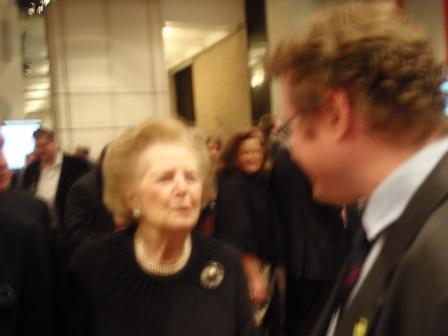Happy Birthday, Lady Thatcher!!!

Lady Thatcher celebrated her 86th birthday yesterday, 13th October.
Many commentators more eloquent than I have written of her achievements, of how her political leadership helped turnaround the “sick man of Europe” as Britain was known in the 1970s. Lady Thatcher’s free market radicalism after decades of creeping and suffocating state control unleashed a cultural and economic revolution in British society.
Nor did her accomplishments end at the water’s edge. Her record of privatisation, de-regulation, tax-cutting, as well as the abolition of exchange controls that freed the movement of capital and trade liberalisation were all underpinned with an ardent defence of individual freedom under the rule of law. In word and deed, Prime Minister Thatcher became a beacon for those seeking liberty and prosperity. For those who would throw off the shackles of the state and liberate the human spirit to flourish, to breathe free, Lady Thatcher is truly an icon of capitalism and the market.
She inspired those facing tyranny and oppression – and, powerfully, she had proven that markets work, even as the socialist states were failing on every measure. On May 2nd 1989, the very day before the 10th anniversary of her first General Election victory, when she became Britain’s Prime Minister at the height of the Cold War, I can only imagine how Lady Thatcher must have smiled when she received those first intelligence briefings of Hungary’s Communist government dismantling the fence along 150 miles of its border with Austria. In the days and weeks that followed, the flood of those seeking freedom, especially East Germans, through that hole helped precipitate the collapse of what President Ronald Reagan called “the Evil Empire.”
1989’s news reports were simply unbelievable to those who’d grown up with the fear that one day the Cold War would turn hot. Eastern Europeans had found a hole in the Iron Curtain and were driving West; Solidarity won elections in Poland to form the first non-Communist government in the Eastern Bloc; the Baltic states declared their freedom; Berliners finally did what Reagan had challenged Mikhail Gorbachev to do two years earlier, “to tear down that wall”; the Velvet Revolution had overthrown the Czechoslovakian government and the year ended in the brief but bloody uprising that toppled Romania’s Ceausescu regime.
During her years in office, Lady Thatcher changed not just Britain; she helped change our world. Critics abound of her government, yet those critics too often and unfairly focus on the consequences that flowed from her tackling the problems that successive British governments had created and left to fester at the heart of the economy, state and society. Those critics were largely silent on the nature and cause of the problems that needed fixing. That’s akin to attacking the doctor for applying a remedy instead of condemning the sickness that necessitates medical treatment.
Thirty years ago, on my 11th birthday, my life was changed immeasurably by Lady Thatcher. I remember sitting on my parents’ bed, opening the cards and a letter from the John Lyon School in Harrow informing me that I’d secured a place for entry in September 1981 – with the tuition fees partially covered by Lady Thatcher’s government’s newly-created Assisted Places Scheme. This was essentially an education voucher to assist less affluent parents to financially support their sons and daughters at independent, fee-paying schools. And I was amongst the first 4,185 students to receive an Assisted Place.
Some 800,000 children were ultimately supported by the Assisted Place Scheme between 1981 and its abolition in 1997; with an average of £10,000 spent on each for their total schooling – just a few thousand pounds per year.
It’s sadly ironic that championing an “anti-elitist” mantra, the privately-educated Tony Blair and the Labour government he formed in 1997 should abolish a scheme that helped talented children of less-affluent families to access the same elite private schooling that he’d enjoyed. Too many parents who can’t afford full school fees or the estimated 10-15% premium on house prices in the catchment areas of good state schools (that’s £30k-£45k assuming a £300k house price for a family home) have seen their hopes and aspirations for their children’s futures dashed by having to send their children to under-performing state schools. It’s no coincidence that the strongest proponents of education vouchers in the US are those less-affluent families who are otherwise locked into a failing state educational sector. Those with money always have choice; those without money don’t. When producers face consumers who have no choice of alternatives, quality invariably falls whilst costs rise.
Rather than abolition in 1997, the Assisted Place Scheme should’ve been expanded; transformed into the full-blown voucher system that Britain needs to provide real choice and control over their children’s education to all of Britain’s families. Instead, Blair sacrificed it – and the futures of so many of our youngsters – on the altar to the great god, equality. I am heartened, though, to watch the new Education Secretary, Michael Gove, quietly setting schools free of state control with his free schools and highly successful academy programme… a softly-softly revolution in how education is provided and funded.
I was fortunate to be able to personally thank Lady Thatcher three decades later for a wonderful 11th birthday present, my Assisted Place, when she attended last year’s Open Europe launch event. Lady Thatcher’s firm grip when I shook her hand and her keen, penetrating gaze, relishing battles fought and won, when I thanked her for changing my life will forever remain one of my most treasured experiences.
Happy birthday, Lady Thatcher!
(This piece was published on ConservativeHome, Friday 14th October 2011: click here.)